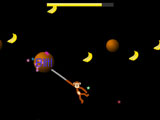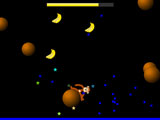Interview with Matthew Wegner (Fun-Motion.com)
Here’s something different: an interview where I’m answering the questions instead of asking them. Andreas Schiffler recently interviewed me about physics games as part of his PhD research. He’s studying how society is impacted by the reproduction–sometimes incorrectly–of physics laws in video games. The interview covers a lot of ground, from specific games to more general, philosophical discussion.
It’s quite long, but I thought it was interesting enough to be posted here. Enjoy!
Related Posts:
- About
- Physics Talk @ Independent Games Summit
- Play Physics Games? Like Taking Surveys?
- Privacy Policy
- Join the Fun-Motion Team! (Help Wanted)
Monkey Ragdoll + Grappling Hook + Bananas = ?
Rocky the Monkey is a new physics game by Rag Doll Software, purveyors of fine physics games. The formula is simple: ragdoll + grappling hook + monkey = fun. The official description of the title is far too excellent to pass up, so here it is:
Rocky the Monkey is a deep strategy game set up in a post-apocalyptic world. Ice caps are melting and water levels are rising at an impressive speed. As a monkey willing to survive, you will have to climb up a series of misteriously floating rocks. Luckily, having been bitten by a radioactive spider, you have gained the ability to shoot webs at will. However, power comes at a price, and you will have to eat bananas constantly to survive. Will you be able to defeat all evil and save the universe?
Control Troubles
The controls in Rocky the Monkey are surprisingly hard to learn considering their simplicity. Standard WASD keys move your simian counterpart, and clicking the mouse will connect or disconnect your grappling hook. Something about the setup isn’t working too well, although once you get past the learning curve it’s smooth banana-sailing from there.
Personally I think the problem lies with the mouse click system. Rather than click and hold to connect an object, you click once to connect and a second time to disconnect. The first few times I played the game I was trying to click and hold and had to consciously remind myself to do otherwise. This usually resulted in disaster.
Never-Ending
There is no level structure in Rocky the Monkey. The world is randomly generated, and the game will simply continue indefinitely as you progress upward. Psychologically I find this has a very negative effect on my play experience. I don’t have a lot of motivation to continue when there aren’t any achievable goals. Something as simple as a break every 100 feet would be enough. As is the game is kind of maddening.


(Rocky the Monkey Game Screenshots)
It’s Free!
It’s hard to complain when the game is free, though, and Matteo decided to release Rocky the Monkey free of charge. Check it out, and if anyone has thoughts on how the controls could be improved feel free to post your opinion. It’s an interesting example of something that should be working well but somehow just isn’t.
Rocky the Monkey Game Info
(The game is now free for customers of Rag Doll Soft games–check site for more info).
Related Posts:
- List of MacOS Physics Games
- Double Dose of Fun with Double Wires
- List of Physics Games
- iPhone Physics Games Launch in July
- Excellent Marble Madness-Inspired Physics Game
Indies Have Opportunity with Physics Games
Chuck Arellano over at scriptedfun has posted a great piece about the competitive qualities of designing physics-based games from the perspective of an indie developer. He makes the case that physics represents an unexplored terrain of game ideas, and physics are within reach of the indie developer. I definitely agree that physics games are unique in the sense that clever ideas have a lot of legs without requiring massive amounts of content (Armadillo Run is a perfect example).
However, it’s obvious that Chuck has a programming background:
The bottom line is, the power to implement physics in games is in the programmer’s hands. And programming is something which the indie is very, very good at.
I’m not sure the issue is necessarily a programmer/artist issue. It’s a content issue. Most modern retail game designs require huge amounts of content. Even if you have some very talented artists, it’s still an issue of scope more than it is of skill. Physics games provide a magnifier for the content you do have time to create.
And, as a quick rant, there are a lot of independent-minded artists out there. For some reason programmers can never find artists and artists can never find programmers. Personally I went to an art school, despite the fact that I became a programmer–everyone I know is an artist (and we’ve produced two titles that have landed in the IGF based on their artistic merit).
Read the entire article here.



 My name is Matthew Wegner, and this site is dedicated to physics games.
My name is Matthew Wegner, and this site is dedicated to physics games.